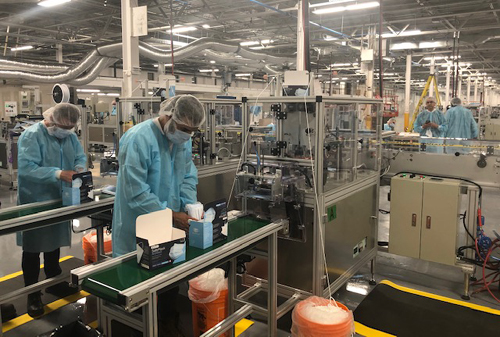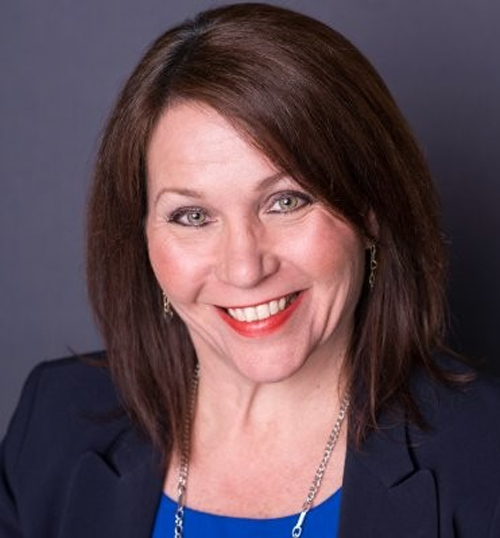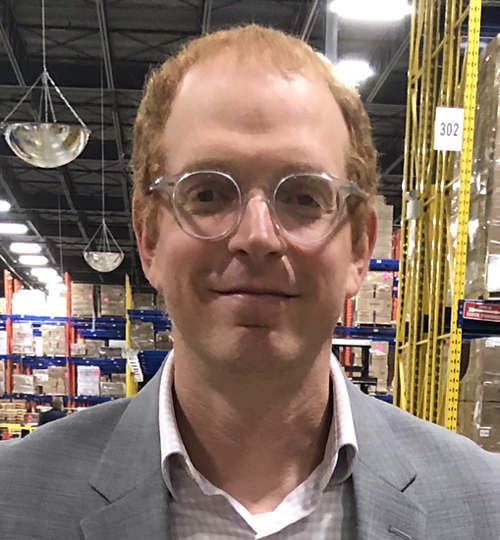Medical device company on a complete pivot to ramp up worldwide production
With a history of more than three decades manufacturing and distributing infection‑control products in some 95 countries, Montreal’s Medicom Inc. is not new to supplying the global market for personal protective equipment (PPE).

Medicom has created new production facilities for personal protective equipment in the United Kingdom, Singapore, France, the United States and Canada.
Medicom was founded in 1988 by CEO Ronald Reuben, who was then in his last semester as an economics major at McGill University. A call from a friend working as a doctor in the U.S., appealing for protective apparel to deal with the AIDS-HIV pandemic, brought him to quit school and become a medical glove wholesaler. Since then Medicom has moved into sales of masks, gowns, sterilization patches, disinfectant sprays and wipes, respirators and more.
But when the COVID‑19 outbreak was declared a pandemic in early March, the medical device company ramped up its operations as never before.
Pivoting in a time of crisis
“Our whole company is on a complete pivot,”
says Gayle Padvaiskas, Medicom’s vice‑president of marketing. She notes that as “demand goes through the roof,” the private company is moving in record time to “local manufacturing for local needs, and making sure we have long‑term agreements that make the capital investment worthwhile.”
Medicom was mostly “in the background” in the past, Padvaiskas says, offering such goods mostly through distribution channels. It is now becoming ever‑better known through media coverage of its colossal manufacturing expansion, such as a recent announcement that it has entered into a contract in the UK to domestically produce 100 million N99‑equivalent respirator masks and 500 million surgical masks.
“We’re protecting frontline health‑care workers,”
says Padvaiskas. This brings pride and puts a focus on Canadian values of caring and looking out for others that resonates in the way Medicom operates.
“We have the Canadian flag pretty much on anything where we do business,”
explains Shawn Fried, director of business development for Medicom. “It has a connotation with quality and standards that aren’t always present in this field.”

Gayle Padvaiskas, vice‑president of marketing of Medicom Inc.

Shawn Fried, director of business development for Medicom Inc.
Medicom’s international strategy includes developing long‑term relationships “and addresses more of the systemic problems”
that resulted in the early panic for PPE, he says. “There will always be a need for capacity to meet epidemics and pandemics.”
Spotlight on Medicom and TCS partnership
Canada’s Trade Commissioner Service (TCS) has been “immensely useful on many fronts,”
Fried says, which has been eye‑opening for Medicom. “The TCS stepped up to the plate and had a network around the world to help us.We benefitted greatly from the added bandwidth that the TCS offers.”
This included dealing with export restrictions, helping the company negotiate with governments on import tariffs for PPE, figuring out logistics to get access to its global supply chain and offering assistance to bring essential personnel into Canada to facilitate the ramp‑up of its mask manufacturing plant in Montreal.
“We learn new things about the TCS that we never knew existed before,”
says Fried. “I’m sure we’re going to leverage and grow the relationship between our company and the TCS as we expand internationally.”
Stephanie Archambault, a trade commissioner who covers life sciences in the TCS Quebec and Nunavut regional office,says that Medicom is clear and focused in its market development strategy, the type of clients it targets and its preferred business model.
“Having a well‑defined international business development strategy, including a roadmap of actions and milestones to set it in play, allows the company to focus its resources in an efficient way,”
she says. “The success of Medicom’s project in the UK goes to show how different jurisdictions internationally can benefit from its capabilities and expertise in PPE.”
Amir Golbang, a trade commissioner in the UK, based in London who covers the life sciences sector, says that the TCS team there has been actively promoting Canadian capabilities and strengths in fighting COVID‑19 to the UK medical and biotech industry, as well with government contacts. As talks between Medicom and the UK government progressed, he recalls, the TCS provided qualified contacts and assistance with sourcing and identifying potential UK‑based partners.
“Medicom is a great Canadian success story,”
Golbang says. “It has capabilities, technology, supply chain as well as regulatory processes well established, and this places it in a unique position to manufacture and supply PPE to various countries in large volumes.”
Archambault says that Medicom especially has a good pitch that “outlines the benefits for prospective buyers of their product and service offering, as well as clearly stating the need they are addressing.”
She notes that the TCS provides information on how government procurement is conducted in different jurisdictions, guidance on the business culture in diverse markets and help in making sense of the regulatory environment.
Medicom is maintaining its expansion
With the support of TCS network around the world and in Canada, Medicom has vastly increased its sales of masks, gowns and gloves, doubling its capacity and creating new production facilities in the United Kingdom, Singapore, France and the United States, as well as here at home.
And now, Medicom plans further international expansion to respond to the public health crisis in the months and years ahead.
Medicom’s global footprint continues to increase exponentially. Before the start of the pandemic it had an on-the-ground presence in nine countries in North America, Europe and Asia, with 1,100 staff. Today that has grown to operations in 14 countries with 1,273 staff, and it continues to add to its ranks, which is challenging in an era of working from home.
“We’re hiring everywhere,”
explains marketing vice‑president Padvaiskas, pointing out that COVID‑19 is the ninth epidemic or pandemic that has brought a spike in demand for the company’s essential products.
“Everybody understands the needs right now, but nobody is really forecasting an end to it,”
Padvaiskas says. There is also greater awareness among authorities of the need to maintain PPE protocols day to day, she adds. “We will ensure to have quality products like Medicom’s to meet future surges.”
Medicom remains grateful for TCS assistance, Padvaiskas adds. “Any touch‑point in this pandemic is useful, with so many shut‑downs and restrictions.”
Adapting to COVID‑19: TCS insights
CanadExport spoke with Stephanie Archambault, a trade commissioner in the TCS Quebec and Nunavut regional office, and Amir Golbang, a trade commissioner in the United Kingdom—who both cover life sciences—about the challenges and opportunities the COVID‑19 pandemic presents, and how the Canadian Trade Commissioner Service (TCS) can help.
How has the way you help companies changed because of COVID‑19?
Stephanie Archambault: Despite working from home since the beginning of the pandemic, we continued to meet virtually with companies, to assist them in their international business development efforts, and to address their evolving needs. The context has given rise to new opportunities for collaboration with trade commissioner colleagues and partners domestically and abroad, and will lead to even more agile and flexible service delivery.
What is your advice to companies in the context of COVID‑19?
Stephanie Archambault: Where the possibility for travel and face-to-face meetings is limited, companies can and should continue building relationships with prospective and existing clients and partners. Technology definitely facilitates many types of communication and can even increase the realm of how collaboration can take place. Keep the channels open and active, and be clear about what you are looking to accomplish.
What is the impact of the pandemic on your sector?
Amir Golbang: In the life sciences sector, it has been a very busy time for me and my TCS colleagues around the world. I have become aware and learned about new innovative Canadian companies with technologies that help with the current situation. It is a good feeling to know that our work potentially has a direct impact on people’s lives and hopefully what we do here at TCS will in a small way help the fight against this virus.
Stephanie Archambault: In the medical devices and digital health segments, the fight against this pandemic has created new business opportunities, especially in the PPE field but for other products as well, such as telemedicine and remote health monitoring.
Any tips or suggestions for Canadian exporters in your sector?
Stephanie Archambault: Canadian companies can and should leverage the reputation of Canada as a reliable source of quality and safe medical equipment and expertise. The TCS continues to actively assist companies like Medicom that offer PPE and other healthcare products and solutions to expand internationally.
Amir Golbang: Continue to be active and approach the TCS for assistance. We are here to help you and put you in touch with relevant contacts, provide market intelligence and hopefully bring your technology to the UK and other markets.
Subscribe to: CanadExport
- Date Modified: